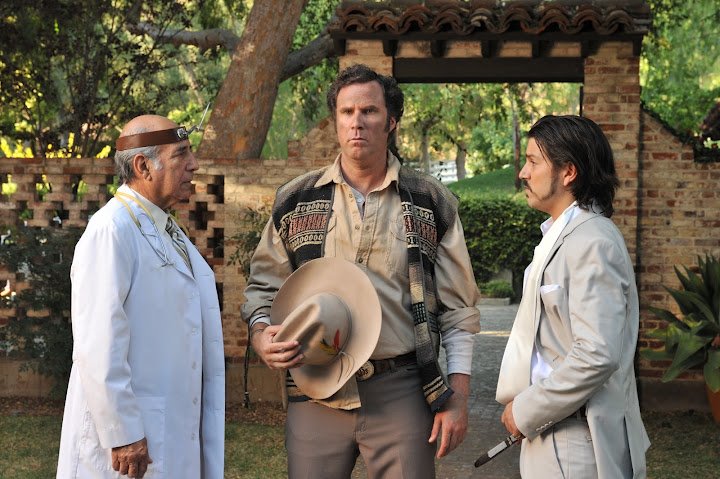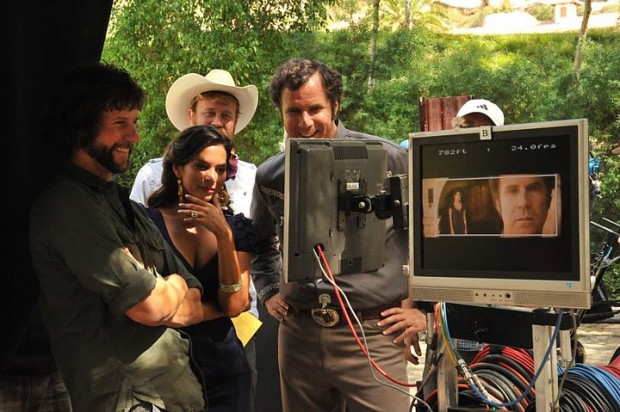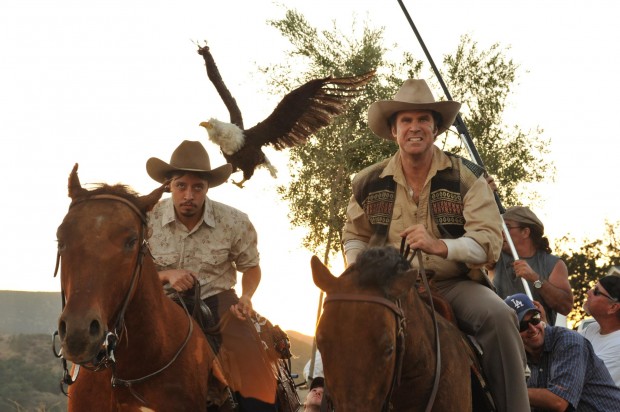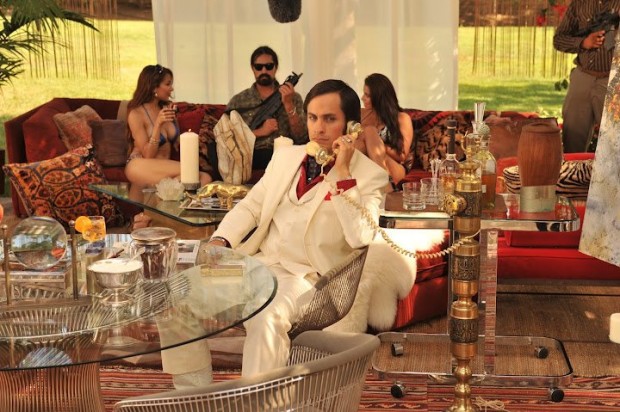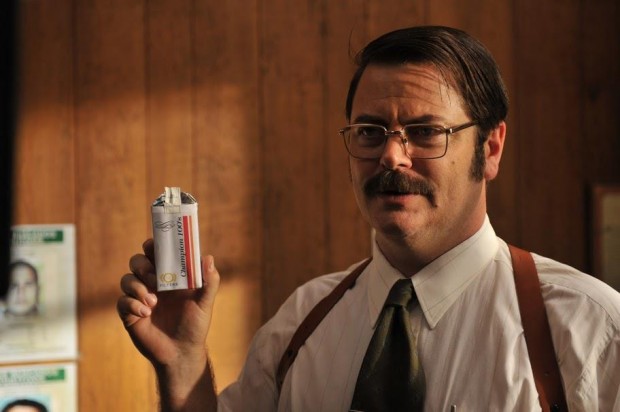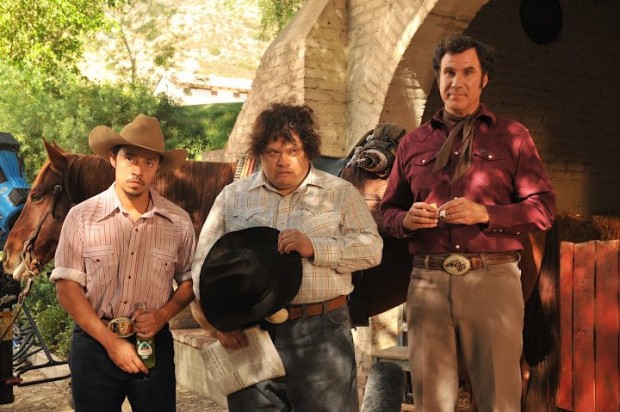
Casa de mi Padre is sold on a concept of breaking the fourth wall and never looking back. All together it feels like a wink at film as a medium while also bringing the laughs. Oh, and the entire film is in Spanish. Last week I was lucky enough to sit down with the star, Will Ferrell, for a roundtable and we discussed butt models, the difficulties of ad-libbing in a foreign language, how he got financing and much more. Check out the video below and transcription following.
So we’ve been informed that you do not speak Spanish. However you did make it look really good. So, what did you do to get ready and do feel like you could have any sort of conversation now?
Yeah, I can have a basic conversation. My comprehension is pretty decent now, I would say. I could not work for the UN. I just had to tirelessly work with a translator and just go over the scenes and also memorizing is one thing but to make sure your pronunciation is on point is almost the harder aspect because I didn’t want the joke of the movie to be that I speak Spanish poorly. I wanted the audience to kind of settle into the fact that ‘he’s actually pulling this off’ and I thought that would be a funnier, smarter choice. At one point it was crazy, I was dreaming in Spanish but it was intense because every day we’d wrap and I’d be like, “ah, yes!” And then it would start all over again the next day. But looking back, I can’t complain about it because the whole thing was my idea.
 The film plays on breaking that fourth wall again and again. It does it right from the get-go. Where did you find the confidence to do that over and over again? Did you test screen? It seems like something you stuck with from the very beginning.
The film plays on breaking that fourth wall again and again. It does it right from the get-go. Where did you find the confidence to do that over and over again? Did you test screen? It seems like something you stuck with from the very beginning.
Yeah, I wouldn’t call it confidence. I’d call it ignorance. We were lucky that NALA Films wrote us a check to make the movie and we thought, “well, it’s too late now, let’s keep going forward.” We just trusted in the fact if we committed all the different things we were doing in the movie at the very least it would just be unlike any movie you’ve ever seen. And yeah, you just kind of keep committing to it and we’ll figure it out later. Who knows if it will work is really the attitude. But you never question it once you start. Yeah, there was no testing of it, it’s a small movie. We only had one official test group on the film, ever. And that was more just to tell us it was a little too long so we cut some things out.
Pedro Armendáriz Jr. is a fantastic Mexican actor. Tell us a little bit about working with him and working with Gael [García Bernal] and Diego [Luna].
Yeah, I think we’re still in a bit of disbelief that we got the cast that we got and when we had heard that maybe Diego and Gael might be interested…to get guys of that caliber in this movie it gives the whole thing legitimacy. But they jumped to the chance to do it. They thought it was so funny and such a unique idea and when Matt Piedmont, our director, talked to Diego I go, “so, what’d he say?” He said he’s read the script and he’s mad. I said “Okay, at least we tried.” He goes, “no, he’s mad because he didn’t think of the idea first.”
They just don’t ever get asked to be in comedies, number one. It was a chance for them to make fun of Mexican cinema in some of these bad spaghetti westerns from the late 70s, early 70s. And at the same time even though we were Americans that wrote the script, it really was the Mexican perspective on what is going on between our two countries. They just loved the comedy and the satire and in terms of Pedro; it was like working with an old Hollywood movie star. What I imagine working with Robert Mitchum must have been like. He had these great little stories and we talked about partying with John Wayne as a kid, cause his dad is a famous actor and he would just hold court in between the scenes and regale us all with stories. Then he’d tell a story in Spanish and I’d try to listen, then he’d switch back to English. But he could not have been a more gracious part of the cast.
And he did get a chance to see the movie?
I don’t think so…
[Editor’s note: Armendáriz Jr passed away in December 2011 after a battle with cancer.]
It’s a film for people who love film. Are you at all concerned with people who don’t feel like they’re in on the joke?
No. [laughs] When you get a chance to make something like this, you just grab it and without any regard for…you’re just not concerned for who is going to get it and not get it. With that being said, I think if you’re super into film or if you’re just looking for something silly or over-the-top, there’s plenty there as well. There is enough for everyone in a way, unless you can’t read. If you can’t read, this is not the movie for you. Unless you speak Spanish. If you speak Spanish and you can’t read, then that’s fine. I’m kind of at a point in my career where you just relish these opportunities where you just make strong choices and go forward.
You could see your heart in it, anybody working on it and it was so much fun to watch.
For Matt and Andrew [Steele, writer] and I, the fact that we all started on Saturday Night Live, literally almost the same year. Everyday was just like movie camp and figuring out what we could to do to make the movie look worse. [laughs] And at the same time though there are real, beautiful, poetic moments in the movie that sneak up on you and they’re beautifully shot and the scene where Genesis [Rodriguez] is on the dolly and coming to to her wedding and her father is playing Whiter Shade of Pale in Spanish and it’s all in slo-mo. It’s almost beautiful in a weird way and then we cap it with cheesy blood dripping off the white rose. So just to put all of that in a big blender and put it out on film was a joy.
When it came to that, going over-the-top, it’s a perfect symmetry of the old parody movies but also it’s very self-aware. It’s very funny seeing your character react to things. But as you said, you had to stick to a script. So when you’re dealing with something that’s completely in a foreign language I bet that hindered your ability to adlib. So how did you creatively add to the movie?
I did not. I just showed up and…no. [laughs] It was predominately at the front of my mind just to execute the lines and do it well. But I was able to kind of find different ways to physically improvise in scenes or just have reaction. I knew in the style and the tone of this movie it was okay if I couldn’t improvise because we could always figure out something later, and we did a lot of that too. That’s where we kind discovered a lot of ADR jokes later which we have those lines of riding away on the horse, “I love riding away on a horse!” Things like that, but between Matt, Andrew and myself we were just kind of a three-headed monster. We would just keep pitching ideas left and right about things and just throwing stuff in.
One of the things that you’re so good at is being able to do these lines with a complete serious face. I know that’s very basic for you but I feel like people want to know how do you do it. I know some of the stuff behind the scenes has to really crack you up. How do you hold it in at that point?
That’s what is great about film. It only takes one take. [laughs] For the eight of nine takes where I kept laughing going, “this is the most ridiculous thing I’ve ever done,” on the ninth take I finally pull it together. But a lot of times you just commit to believing what you are saying is absolutely real and then it kind of takes you out of trying to be funny. You are just committing to that thing and then you can do it with a straight face.
Nudity on film for a lot of people is something tough to handle. Was there an ass model?
No. [laughs] For Genesis there was, but not for me. But my butt isn’t the one that you think it is. Mine’s the lady butt. That’s how I take care of my butt. Or the plastic butt. No, butts are easy. Frontal would be a whole different…that’d be tough.
As someone who speaks Spanish, I thoroughly enjoyed it. I didn’t even read the subtitles. Are you worried a lot of the stuff would get lost in translation anyway?
I think that’s the potential of why this movie can work for both audiences. I think you’re getting jokes that obviously people who aren’t fluent…there’s a whole extra level that you’re getting. One of things that we had a constant battle with is that our script supervisor is bilingual and we had a lot of Spanish-speaking crew members and we wanted Armando’s in that usted form, kind of stilted, the way you teach Spanish in high school kind of way. And everyone kept correcting us, saying “you would never say it like this.” And we said, “we know, don’t change it!” Our translator kept getting notes to change it and we’d have to change it back. So that’s a joke that an English-speaking audience is never going to get and a lot of the slang that Diego uses…
And even some of the other characters…
Those are little things for people to discover later and I think it’s great if people get to watch this movie again down the road and say, “did you know the guy playing the piano is this huge Latin singer and the father of Genesis, who plays Sonia, is…” so there’s all these undiscovered, hidden things.
So it will go to Mexico, I assume.
That’s the crazy thing. It’s a bigger release in Mexico than it is here. We’re on like 300-400 screens in Mexico and here it’s just 375. At least initially, hopefully it’ll platform out. Which is kind of cool. Nothing would make me happier to have a bigger hit in Mexico.
A whole line of sequels…
“The movie the studios rejected!”
Besides the Spanish, what was some of the difficulties going into it?
Working with the team we had, we’re all just friends so it didn’t feel…the language was the most daunting thing in that way. There was, in hindsight, a little bit of pressure of how my castmates would feel about my Spanish and things like that, but then again I was always like it’s a comedy so it’s all going to be okay. We definitely had production issues at the time; shooting the gun fight scene with all those elements and stunts and things like that.
Where do you go from here? Are you going to take a sequel to it?
I think it’s over after this. [laughs] That would be – I’m probably going to regret saying this – to carry on…cause in the world of soap operas people can come back from the dead, anything’s possible. So it’d be a blast to do another one. We’ll see, there are no imminent plans. This was kind of a one-off crazy thing to try.
What does success mean to you?
I’m firm believer in that if you are able to build up any sort of capital in this business that it’s wisely spent on projects like this. Why not use that to take chances and give life to other forms of alternative comedy and things like that. Also success to me means I still feel super fortunate that I’ve had life beyond Saturday Night Live, which is not usually the case. It’s really hard to do. But I feel like as long as I have the chance it’s my obligation to keep testing the boundaries of what I can do and what I can give opportunity to those kinds of projects.
You talked about your using your cache to get this kind of film made. With labors of love, it is a labor. Was this a difficult film to find financing?
It was easy in the sense that we found this company, NALA Films, that got it right away and it was one of the first meetings we ever had. We gave them the price-point and we’re like we’d like to do this for 5 million bucks and they were pretty much like, ‘we’re in.’ So we went to a couple other places and we didn’t really try the studio route so I don’t know if we had gone on to all the studios, would we have been rejected or not. In terms of distribution, because we screened it for everyone and there was only one buyer. Which is kind of interesting, all the studios passed on this cast and for that budget, especially when all you hear about is how big the hispanic market is in terms of movie-going audience.
I would have put my money on the fact that this would have gotten distribution from a major studio, but it didn’t so maybe that speaks to the subtitles and it is a pretty crazy movie. So I guess it would have been hard but in terms of labor of love, once we got it going we were scrambling all the time but when you know you’re going to scramble that’s just part of the gig and it feels like that’s what you should be doing. Other than shooting in a crazy LA heatwave at the time, I think the scene where Nick Offerman speaks all of his bad Spanish to me it was 104 [degrees] that day. That was one of the labor-intensive days.
If this film was up for an award, would it get best sex scene or best extras casting?
[laughs] Probably best extras casting. Then again it might be the first scene in cinema where someone has had sex with a mannequin, a full body prosthetic. Revolutionary. And what award show are these awards at? I’d like to imagine what award that was, where they give awards to mannequins.
Retail Owners of American?
I like it. [laughs]
Casa de mi Padre hits limited release on March 16th.

